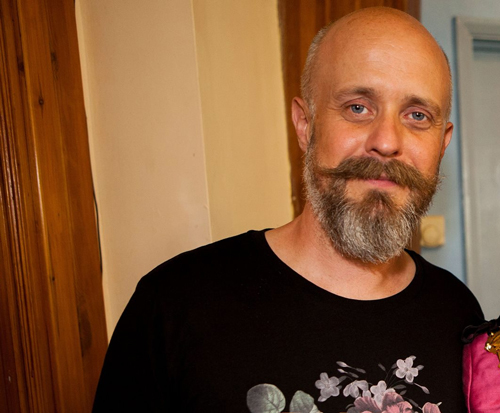
"We have stopped meeting on Sunday - and now have our main gathering on Thursdays"
Nick Graves from Old Lodge Lane Church in Purley, south London
Pre-lockdown Sunday mornings typically served a small, faithful, more elderly congregation. Nick had been questioning whether the Sunday service was right for the church’s context for some time. “It seemed to be historically related, which is not necessarily a bad thing, but I’d just become really uncomfortable with that model, led from the front, often by a middle class person. There was also the time – people are involved with sport or wanting a lie-in on a Sunday morning. For the community in which we’ve been placed, it didn’t seem the best way of helping people discover and deepen a relationship with God.”
Indeed, Old Lodge Lane had experienced another way. Five years ago the church began to host an alternative fortnightly gathering called Thursday Tea. It was based around a community meal and the three values of Eat Pray Love – and though it looked different to a traditional Sunday, “theologically, it’s what gathered church is meant to be,” says Nick. It was also more in keeping with the way children are currently educated - ‘less about front-led teaching, and much more experiential’.
At its height Thursday Tea was welcoming around 90 people, and the church’s increased community contacts led to involvement in a pilot scheme called ‘the one stop food shop’ alongside Croydon Council and the food charity FareShare. (This was due to launch in June, but when lockdown happened the church adapted, arranging for food deliveries to the most vulnerable in its community.)
“It means that when you compare the two models – Thursday and Sunday – it’s very easy to see that one was thriving, and one wasn’t,” says Nick.
The direction in which the church was travelling developed further following lockdown. It opted not to have online service as a large part of the congregation don’t use the internet, instead encouraging people to deepen their own relationship with God using some of the skills in a course it had done. “People actually really got a hold of that,” says Nick. “When not being spoon-fed from the front, they were capable of studying scripture themselves; learning the art of silence, contemporary spirituality; all without the need for the traditional Sunday format.” It meant that once restrictions lifted “it became clear that Sunday wasn’t actually missed.”
The church nevertheless recognised the importance of gathering together, so opted to reinstate something on Thursdays.
It’s different to Thursday Tea (no food can be involved given current restrictions), but still an alternative-style gathering, starting at 7pm and lasting no more than an hour. Because there isn’t the pressure to include everything that would be expected on a Sunday – worship, prayer, sermon, communion – Nick says there is freedom to experiment and draw more on some of the ideas and traditions of the diverse community in which they serve.
So far they have been majoring on prayer, and exploring different ways of thinking about and doing worship. A podcast is recorded so people can access in the teaching at their own time and pace. It’s helped to draw in a number of those on the fringes, such as those who volunteer with the food distribution.
“It’s been an amazing time,” says Nick. “It’s very diverse ethnically and age wise. There’s a real sense of God’s presence in a way we have not experienced.
“It’s wilder. We are journeying without a map: we’ve no idea what it might look like in the long term, but we are ok with that.”
Nick stresses the congregation are on-board with the decision “One person has been unhappy, but hasn’t left in a huff! We have spent two to three years talking and praying about it. It’s not been a decision sprung on people.
“We came to the conclusion that what we had done for 60 years in terms of getting people to come on a Sunday was no longer the right approach, yet we’ve seen people will come on a Thursday. In many ways it’s quite a pragmatic decision, and the current crisis has allowed us to make the leap.”
He adds: “Our association with Sunday brings so much tradition and history. Removing ourselves from those expectations is both freeing and scary as there is a security in the trusted material, but we should not be afraid of changes.
“If it grows wild, it’s not a bad thing. Who know where this is going? What we came to realise was that God wanted us to move away.”
This article was first published in the Spring 2021 edition of
Baptists Together magazine. Click here to
download a pdf version of this article.
 Nick Graves
Nick Graves is minister of Old Lodge Lane Church in Purley, south London
Photo: Old Lodge Lane Church